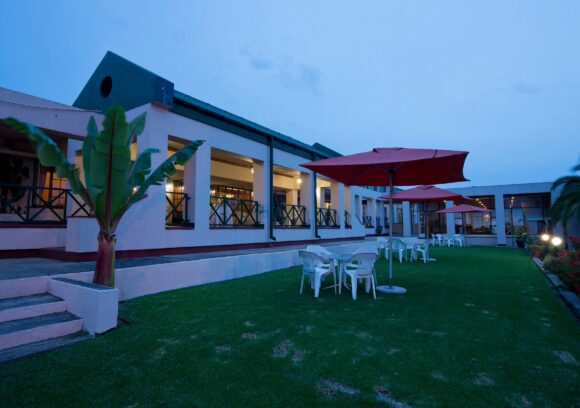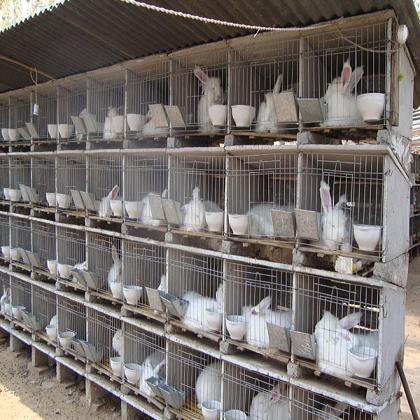Passionate rabbit farmer blossoms
AFTER completing her diploma in animal and health production at Mazowe Veterinary College in Mashonaland Central, Mrs Ntokozo Sibanda (38) of Bulawayo, had no idea that she wanted to do with her academic certificates until a friend offered her four rabbits.
Despite lack of specialised expertise in rabbit farming, she gradually developed a strong passion for bunnies and riding on her knowledge in the field of animal production, she grasped the concept.
Today, Mrs Sibanda is a successful commercial rabbit farmer with over 200 rabbits of different breeds kept at her two rabbitries in Selbourne Park and Cowdray Park suburbs in Bulawayo.
Since venturing into rabbit farming three years ago, life has never been the same for the rabbit farmer.
Rabbit breeding has turned into a profitable commercial venture, which has enabled Mrs Sibanda to reinvest the proceeds in her business while meeting other financial obligations.
With the growing demand for rabbit in Zimbabwe, Mrs Sibanda, who is studying towards a BSc in Animal and Wildlife Sciences at the Midlands State University (MSU), said the breeding business was booming like never before.
Upon realising that very few people in the country, particularly in the Matabeleland region were practising proper rabbit breeding, Mrs Sibanda started mass production of rabbits with her major focus on breeding. Her target market is up-coming farmers.
She keeps Chinchilla, New Zealand White and Dutch breeds and the initial stock breed was imported from South Africa. According to Mrs Sibanda, the breeds provide better results for rearing rabbits for commercial purposes.
“When I started breeding rabbits three years ago after a friend of mine offered me three Chinchilla giants and a Dutch. I had little knowledge on rabbit farming, but through learning from other breeders as well as applying what I learnt at college, I managed to get where I am today,” she said.
“My interest in rabbit farming blossomed until I joined Zimbabwe Commercial Rabbit Breeders Association (ZICORBA) in 2020. Through breeding rabbits, I discovered that I can actually earn a bit of money to feed my family.”
Mrs Sibanda has also started helping other up-coming farmers who want to get into commercial rabbit breeding.
Her success story has incited many farmers to venture into the business.
“Breeding rabbits is a relatively new commercial venture, which you can actually grow into massive heights. Rabbits require less capital, limited space and a modest amount of food to survive,” she said.
With increased demand of rabbit meat due to its delicacy and nutritional value, individuals, restaurants and retail shops have turned out to be Mrs Sibanda’s clientele.
“Rabbit farming has large profit margins and the rabbit output is consistent throughout the year because it is not a seasonal enterprise. The pace at which they convert food is faster than that of other animals,” said Mrs Sibanda.
“A doe (female rabbit) can have anything from 2-15 babies each time she gives birth. In a year, they can breed six times depending on how you feed them. We feed them with rabbit pellets and lucerne for weaners.”
She said it is important for rabbit farmers to keep hay in the cage as it is good for their digestive system.
“Rabbits should be reared in cages inside a shed so that they can be supplied with food and water in a much easier way,” she said.
“A rabbit can eat normal organic matter and convert it into protein-rich flesh in no time, which is why its meat is high in nutrients.”
Mrs Sibanda said rabbits should be provided with feed at a particular time daily and because of high temperatures, they don’t eat in the afternoon.
She also cultivates lucerne at her rabbitry in Cowdray Park where she keeps about 150 rabbits for breeding purposes.
“As rabbits are herbivores you need to provide them with proper nutrient-rich feed. I cultivate lucerne and give them as green feed, which helps them increase their growth rate and the proper development of muscle tissues,” said Mrs Sibanda She gives them 100g each of pellets once a day and water.
“Rabbits are not easily prone to diseases, and if at all they develop diseases, then it should be attributed to improper feed management or improper maintenance of their shed. Rabbits’ health is highly dependent on how you maintain their shed,” said Mrs Sibanda.
“If the shed is maintained unclean, the rabbits easily develop infections which result in less growth rates.”
Mrs Sibanda said the increase in rabbit meat is partly driven by health consciousness.
“Rabbit meat is leaner and healthier and has higher protein, calorie, calcium and vitamin content than any other animal flesh. Cholesterol, fat and salt levels are lower than in other meats,” she said.
Mrs Sibanda said female rabbits take five to six months to get mature while male ones attain maturity at six to seven months from the time of their birth. Their pregnancy period is 30 days. “A rabbit can kindle between eight and 15 rabbits in 30 days. In a month, it would have given me 15 more rabbits at most and in three months, I can then sell them. The good thing about rearing rabbits is that their offspring grow fast and reach breeding and marketing age quicker than other livestock,” she said.
In terms of value chain, Mrs Sibanda said rabbit skin is used for making bags and jackets while urine is used to manufacture fertiliser and pesticides.
“Rabbit urine is very rich in nitrogen, it is very effective on vegetable crops like cabbage, lettuces, cucumber, watermelon and other vegetables at any stage of growth. Other end products obtainable from rabbits such as fur and manure even make breeding rabbits more attractive to small scale farmers,” she said.
In terms of prices, they range from US$10 for a six-week-old rabbit and when it reaches breeding stage, it becomes more expensive.
“My future plan is to expand and have at least 1 000 rabbits so that I can be able to supply at a larger scale. I am also exploring the export market and just recently, I received an enquiry from a Zambian farmer who wanted to buy 200 does for breeding purposes,” said Mrs Sibanda.
“For now, we are selling locally mostly to Raymeg Consultants in Harare, which owns Zimbabwe’s sole rabbit abattoir.”
Presently, China, Italy, Spain and France are the leading producers of rabbit meat globally.-The Herald










